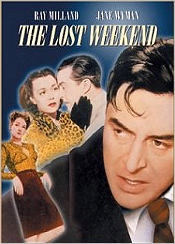 |
The Lost WeekendParamount |
|---|
 |
The Lost WeekendParamount |
|---|
|
Ray Milland - Don Birnam Jane Wyman - Helen St. James Phillip Terry - Wick Birnam Howard DaSilva - Nat the Bartender Doris Dowling - Gloria Frank Faylen - Bim Nolan |
Billy Wilder - Director Charles Brackett - Producer John F. Seitz - Cinematographer Billy Wilder - Screenwriter Charles R. Jackson - Original Novel Miklós Rózsa - Film Score |
The Lost Weekend, a 1944 best-seller by Charles Jackson, was one of four novels that Paramount's star director Billy Wilder, traveling from Los Angeles to New York by train, bought at a kiosk during a Chicago stopover. Wilder was up all night reading it twice and making notes. From New York, Wilder called Paramount production head Buddy DeSylva and asked him to look into buying the movie rights. DeSylva was dubious about the novel's screen possibilities, but paid $50,000 for it on Wilder's say-so.
Other executives at Paramount felt that the book was sordid and un-commercial. In Jackson's novel the problem tearing away at the hero is fear of his homosexuality. (In 1940s Hollywood, alchoholism seemed a fair exchange, as a moral and social stigma, for homosexuality.) "Not only did I know it was going to make a good picture," Billy Wilder stated, "I also knew that the guy who was going to play the drunk was going to get the Academy Award." Ray Milland accepted the top role, even though higher-ups at Paramount thought it was career suicide.
Much of the move was shot on location in New York City: Third Avenue pawn shops, Bellevue Hospital, P.J. Clarke's East 55th Street bar and other sites. Street scenes were shot with a hidden camera. Takes were sometimes ruined when people recognized Milland and asked for his autograph. Before shooting began, Milland existed on a diet of dry toast, coffee, grapefruit juice and boiled eggs in order to give himself the look of a man who habitually forgets to eat. The actor dropped from his normal weight of 168 to about 160.
To research his role, Milland spent a night in Bellevue Hospita's psychiatric ward. After obtaining permission, he donned hospital pajamas and was assigned to a bed. Also in the ward were about 15 men, most of them (he was told) veterans of the advertising profession. One man was once a big city mayor. Milland was later wakened by the screams of an inmate being manhandled by attendants. As the man was being strapped to a bed, other inmates began swearing. Milland wrote in his autobiography, "Then from across the room a long undulating howl started, the sound coyotes make at night in the high deserts of Arizona."
All of Billy Wilder's noir dramas contained a biting social comment, a stinging disapproval of the American way, that became his trademark. Double Indemnity (1944), The Lost Weekend (1945), Sunsent Boulevard (1950) and Ace in the Hole (1951) were all thrillers with a social focus. True to Wilder's prediction, Milland's star performance in the harrowing psychological drama earned him an Oscar. Other Oscar winners were director Billy Wilder, screenwriters Charles Brackett and Wilder, and the film itself. When Wilder and Brackett arrived at Paramount's Writers' Building the day after the Oscars, liquor bottles were dangling from dozens of windows.
--from the production notes of the Universal DVD
release of The Lost Weekend, 1945.
The noir psychopath, inevitably, is bedevilled, pursued by ghosts from his past; and he is often fatally self-divided. Sometimes the schizoid motif is presented in a literal way, as in A Stolen Life (1946), The Dark Mirror (1946) or Dead Ringer (1964), stories about good and bad twins sisters. Sometimes it is dramatized as conflicting aspects of the same personality, as in So Dark the Night (1946), The Lost Weekend (1945), and Psycho (1960). And sometimes it is offered as an exchange between two different but insome ways parallel personalities, as in Shadow of a Doubt (1943) and Strangers on a Train (1951).
The division between virtue and vice in such films as The Lost Weekend exists within a single protagonist. "There are two Don Birnams," explains the protagonist (Ray Milland): "Don the drunk and Don the writer--I've tried to break away from that guy a lot of times, but it's no good--that other Don always wants us to have a drink." Alchoholism is presented as the moral equivalent of the wicked sister in The Dark Mirror, eating away at the good Don, keeping him off the track.
During his lost weekend, Don succumbs to his demon--alcohol is the devil that must be exorcised before its victim can return to society as a whole person. "Don Birnam died this weekend--of shame, the DTs, moral anemia. He wanted to kill himself," "Get rid of it by writing it down," suggests his girlfriend Helen (Jane Wyman), who has been fighting his addiction as if it were a rival. Overcoming the writing block which contributed to his collapse, Don vows to record the events of his weekend.
The film's rosy and quite incredible resolution suggests that Don becomes whole after having descended to rock botom. Utter damnation leads to improbable salvation, according to the drama's artificial scheme. The character's breakdown, presented in a vivid noir style, with the city weighing down on him during his long, isolated weekend, is far more convincing than his last-minute rehabilitation.
--FOSTER HIRSCH, from Film Noir
The Dark Side of the Screen.
A selection of Lost Weekend related films.
|
Find Lost Weekend on eBay.com
A selection of Lost Weekend related books.
|
|
home: The Noir 'net |
back to: ALMOST NOIR |
|
Any comments, additions or suggestions
should be addressed to: The Noir 'net / Eric B. Olsen / ericbolsen@juno.com |
Other Web Sites:
History of Horror Hard Bop Homepage The War Film Web Author Eric B. Olsen |